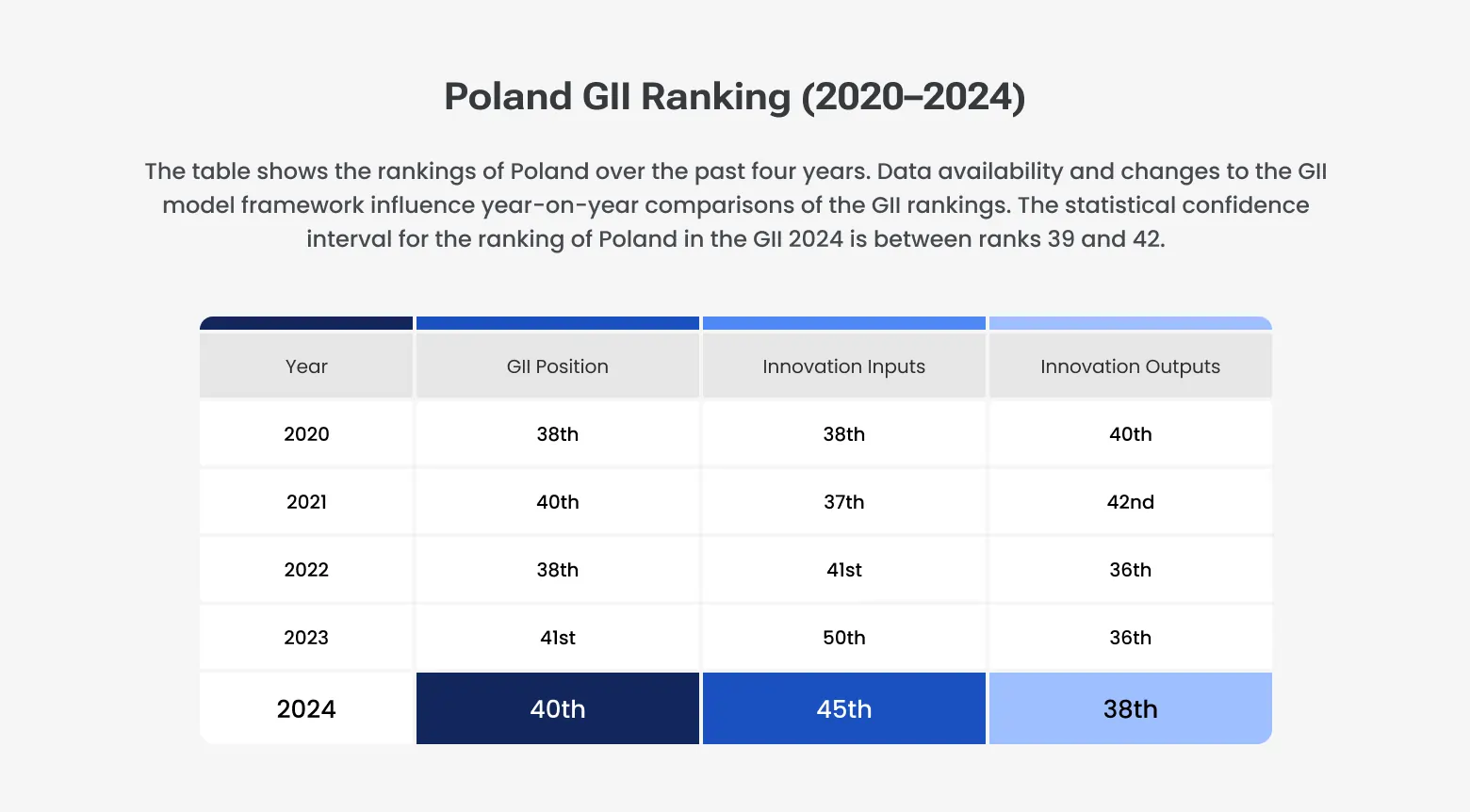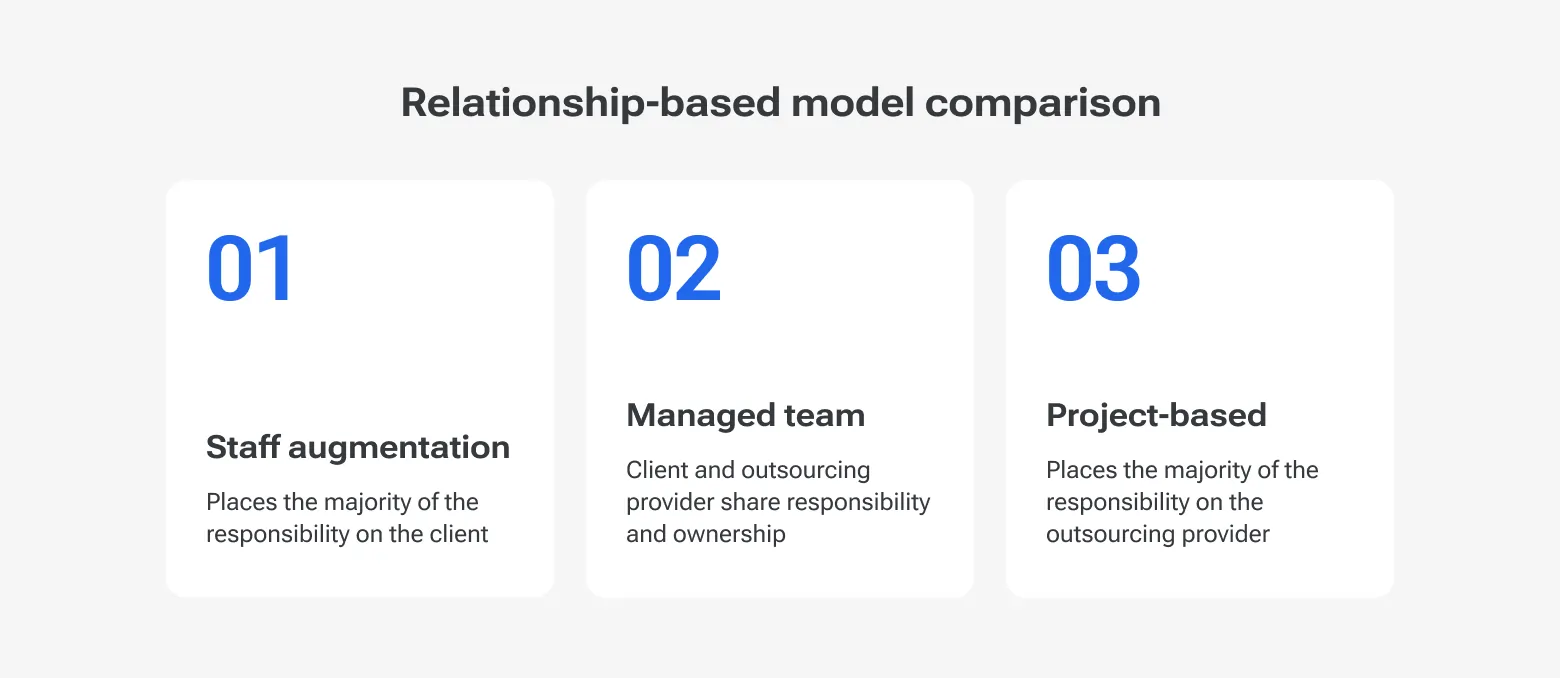Rising costs, missed deadlines, and a lack of in-house expertise. Only three statements, but how much anger and frustration, innit?
Relatable. If your Google search contains inquiries like “How to rob a bank” instead of “How to develop an app for reasonable cost”, this is the only solution. Software outsourcing to Poland.
The country gains ground as a leader in the service tech industry. Let’s count: a deep pool of skilled developers, strong regulatory frameworks, English proficiency, convenient time zone… As a CTO, startup founder, or IT leader, you may recognize an advantage of this mix.
Three factors make software development outsourcing in Poland an outlier:
-
Quality and expertise: Education system produces top tech talent.
-
Economic efficiency: Pricing is too finger-licking to ignore Polish software developers.
-
Innovation and stability: Despite its proximity to a war zone, the country is stable and safe.
Let’s hash these out.
Flexible staff augmentation and expert software developers in Poland
Key attributes of software development in Poland
Quality of developers ≠ higher rates
Fellow consultants come before devs. To hire software developers in Poland it’s worth taking consultation with a local who knows the ropes of the Polish software development market. These specialists will ensure fair rates and probably will assemble the proper team according to your needs.
Yet, sometimes, dev houses offer pretty transparent cooperation models and time-tracking reports so that you just don’t need such a consultant.
Anyway, figure on PLN 8,000 - PLN 13,000 per middle software developer per month (the median line is USD 3,000). You’ll agree this is quite a nice tag compared to Western Europe or the US.
Talent to your liking
In early 2024, Poland had over 520,000 IT professionals. The foundation is STEM education and a continuous influx of graduates from the University of Warsaw, AGH University of Science and Technology, Jagiellonian University, and other institutions.
Many businesses want to decrease costs when creating a new and complex product and therefore look for outsourcing. Poland has proven its proficiency in AI, Machine Learning, Blockchain, and IoT. That’s why US companies turn to Poland when it comes to cost-efficient tech problem-solving.
Western-like culture and time zone
Many talk about Polish services, and many also state that Poland has a Western-like mindset. Is there room for doubt? The 2023 Global Services Location Index shows that not. The source ranks Poland as the second most attractive location for business services after the UK.
They are used to agile methodologies, they are punctual, they appreciate transparency — The Poles really align with Western business practices.
Also, we can’t forget English proficiency. Poland ranks 15th in the Global English Proficiency Index 2024, and five Polish cities have the highest scoring level. What does it mean in practice?
Regarding the time zone. Poland is in the Central European Time (CET) zone and has a significant time overlap with North American markets. So, it’s quite convenient to offshore software development in Poland for US clients. Anyway, the Poles are flexible and approachable — you’ll likely talk them into the working schedule required for your project.
Outsourcing software development to Poland: Market overview for 2026
Stability in any meaning except innovation
If we look at the global map, Poland is a stone’s throw from the war in Ukraine. Yet, EU and NATO membership give Poland protection, a stable political environment, and… a strong legal framework. Adherence to GDPR = robust data protection and transparency you, as a US/UK/foreign client, can count on.
Also, Poland makes headway in innovations. In the 2024 Global Innovation Index, Poland ranks 40th among the 133 economies.
Step-by-step guide to outsourcing to Poland
Step 1: Know your requirements
You can’t arrive in Nicaragua without a navigator. Okay, maybe you can, but anyway, with a detailed map or a GPS it’s easier, innit? The same story is with outsourcing projects — hash out your requirements.
Project scope: Functionalities, features, and deliverables expected from the executing team. Two frameworks for you (they go beyond the scope, but still): PRINCE2 and Work Breakdown Structure (WBS). They help decompose the project into manageable tasks and simply give you focus.
Technology stack: Take a consultation to select appropriate technologies for your project and don’t fail to meet industry standards. For instance:
Frontend: React.js, Angular
Backend: Node.js, Django
Databases: PostgreSQL, MongoDB
DevOps: Docker, Kubernetes
Budget: Set the limits, define the real budget, and then x2 it, just on the off chance. There are always some factors beyond development, testing, deployment, and maintenance that influence the bottom line.
Metrics: Don’t shy away from measurable outcomes. Some of the most important indicators for your tech team are:
Step 2: Choose the right outsourcing model
-
Staff augmentation: External specialists integrate into your existing team and, this way, fill skill gaps. Flexible enough and controlled. Staff augmentation services is your go-to option for projects requiring specific expertise.
-
Dedicated development teams: Since we’re talking about Poland, this model means that you hire software developers in Poland who work exclusively on your project. Dedicated development teams give you focus and it’s ideal for long-term projects since the requirements may change several times along the way.
-
Project-based outsourcing: You delegate the entire project to an external provider. The provider plans, delivers, checks quality, and makes adjustments if needed. An effective option for projects with clear objectives and timelines.
Step 3: Find the right partner
When choosing an outsourcing partner, think over the following:
Expertise: Pay attention to technologies and methodologies they use. Obviously, approaches and tech stack should be relevant to your project. Also, check certifications, contributions to open-source projects, and thought leadership in the industry.
Portfolio: Review QA case studies and previous work to assess their experience with similar projects. Pay attention to complexity, the approach, and outcomes.
Client reviews: Seek testimonials from reputable sources and look up their side activity, such as podcasts or YouTube videos with industry leaders and even clients. These actions can speak louder than words — how many clients (that already paid actually) do you know that record podcasts with an outsourcing provider? Probably, says a lot about their humaneness and expertise.
Security compliance: Ensure adherence to international standards (ISO/IEC 27001 and others). Verify their data protection protocols, incident response plans, and compliance with regional regulations (GDPR).
Cultural fit: The rule of thumb — don’t work with as… You got the message. Communication style, work ethics, and values mean a lot for the project’s bottom line. Yet, these nuances often stand clear after the actual work, not in the assessment phase.
Why Devico
Technical expertise: JavaScript, Python, Angular, Next.js, React — you will definitely find specialists with the required skills, frameworks, and languages.
Proven track record in 12 niches: We have a diverse portfolio, but our tech teams have a specific focus. We don’t involve “healthcare devs” in FinTech projects.
Client and partner satisfaction: 5.0 on Clutch, excellent reviews on GoodFirms, and regularly published podcasts with our partners — we’d not achieve this without being good guys.
Compliance: We understand the importance of IP and data protection. That’s why we obtained ISTQB and ISO [ISO 9001, IDT, ISO 20000, ISO 27001] certifications, as well as cloud ones.ʼ
Step 4: Fine-tune communication
Tools: Pick the messenger or the entire platform, depending on your team size and goals:
Small teams (1-5 members): Slack for instant messaging, Trello for task management.
Medium teams (5-15 members): Jira for project management, Zoom/Google Meet for virtual meetings.
Large teams (15+ members): Microsoft Teams for integrated communication, Planner or Jira for end-to-end project management.
Best practices
-
You could do with clear protocols — documentation and policies might seem unnecessary at the beginning, but when the team grows, it becomes challenging to properly integrate new team members without disrupting working processes.
-
Schedule regular updates and define roles to maintain alignment.
-
Encouraging team members to proactively raise concerns or issues before they escalate.
-
Document all important decisions and discussions.
Time zone management: The country operates in Central European Time (CET). This allows for real-time software development. In Poland, you can always communicate asynchronously, using one of the tools described above whether you are a European client or a North American client. Important note: it’s not only the vendor’s prerogative to adjust their schedule; be flexible too. Use time zone converters to define relevant time for meetings if needed.
Step 5: Pilot first
Three important steps here:
-
Objectives: Goals must be specific. Zero in on technical outcomes and communication efficiency. If you have enough tools for measurement, add the influence of cultural compatibility.
-
Duration: The timeframe should be reasonable; the inadequate pace will exhaust the team and drain resources. Sometimes a slow-but-steady approach makes a bigger impact than fast (and rushed, in fact) implementation.
-
Evaluation: Analyze outcomes to make baked decisions about proceeding.
Step 6: Ensure security and compliance and keep monitoring
GDPR compliance and IP protection: In Poland, the most influential regulation in terms of data is the General Data Protection Regulation (GDPR). Also, the Personal Data Protection Act supplements GDPR provisions locally. As of control, the President of the Personal Data Protection Office (UODO) oversees compliance and maintains a reliable framework for data security.
Key performance indicators (KPIs): Implement metrics that will reflect your goals and a path to them. These may be code quality, user satisfaction, or any other figure.
Agile development: Agile methodologies enhance adaptability, encourage continuous feedback, and promote iterative progress.
Scaling teams effectively: Scale wisely. Try to keep processes streamlined and well-organized, without disruptions when new team members break in (use modular team structures and standardized onboarding processes).
How much does it cost to outsource to Poland?
One of the primary reasons why IT outsourcing services in Poland are worth your time is the balance between cost efficiency and high-quality output.
Yet, before you decide to offshore software development to Poland, it’s crucial to tally costs precisely for your project. Below, you can find the median for hourly rates so that you can roughly understand the bottom line. To totalize a precise sum, it’d be better to book a call with the tech and ops teams.
How much does it cost to outsource software development to Poland?
Hourly rates of Polish software developers
Junior developers (0-2 years of experience): USD 30 to USD 40 / hour.
Mid-level developers (3-5 years): USD 50 to USD 65 / hour.
Senior developers (6+ years): USD 70 to USD 90 / hour.
Specialized roles (e.g., AI, blockchain): Rates may be higher, depending on the demand and expertise.
Once again, these are average figures, actual rates can vary based on project complexity and developer skillsets.
Hidden costs
Legal fees: To run an IT business in Poland, you must ensure compliance with international and local laws. However, a simpler way is to hire full-stack developers in Poland who already have proper agreement templates, paid compliance fees, and generally covered all additional issues. It’d cost some more, but if you want to save time and nerves, it’d be an excellent choice.
Infrastructure: Hardware, software licenses, and development tools — leading software development companies in Poland cover these expense items. But it’s still more often when these costs are on the client’s side.
Project management: Dedicated personnel or tools — also will entail some costs.
Comparison: In-house development vs. IT outsourcing
An in-house team brings in salaries, benefits, training, and overheads. That’s why many foreign companies (and, to be completely honest, any conscious business) choose outsourcing. And for this reason, cost of outsourcing to Poland is the best bet due to the price and quality balance.
For instance, Western European developers may charge EUR 80-120 per hour, while Polish developers offer comparable skills at lower rates.
On the other hand, some other outsourcing destinations like India compared to Poland might offer slightly lower rates. But weigh up the overall value proposition — do the quality of talent, stability, and cultural compatibility really meet your expectations?
How Devico provides cost-effective solutions without compromising quality
Devico has a team of skilled Polish talents (Angular, Java, JavaScript, Node, Next, etc.) and delivers high-quality software (Clutch 5.0, video testimonials are also available).
With efficient project management and adapting industry best practices to a particular case, we ensure clients receive value-driven and tailored solutions.
Outsourcing to Poland: What challenges you may encounter and how to overcome them
Talent competition: How to secure top developers
As we stated before, Poland is sheltering over 520,000 solid software developers. Let's be clear: We don’t mean that there will be a masterful developer everywhere you go. But Poland has a really strong technical base, which makes it very likely that you will find your match.
And this is where competition for the top dogs enters the chat.
To attract top talent (obvious yet working advice):
Offer competitive compensation: Everyone loves money. Sounds a little marginal, but that’s modernity. At least, you should align with market rates to appeal to skilled professionals.
Convey your mission: Maslow wisely placed self-esteem almost at the top of his pyramid. Belonging to a mission-driven company and cutting-edge technologies will attract skilled professionals with higher precision.
Create a positive work culture: Ensure opportunities for growth, learning, and collaboration.
Managing remote teams: Use best practices for smooth collaboration. Don’t over-limit and overcontrol your teams as, this way, you decrease morale and innovations in every area.
But how to manage distributed teams? Here’s how (working advice 2.0):
-
Relevant communication tools: Don’t use a full-fledged Atlassian plan before you reach at least 10-15 people. Slack, Zoom, Jira, Asana — your goal is clear and consistent interactions, so analyze features before opting for a particular tool.
-
Clear protocols: Define workflows, responsibilities, and expectations from the outset.
-
Regular check-ins: Can’t help but admit — consistent meetings really help. You can check the progress, address concerns, and regularly scan the atmosphere in teams.
Compliance and IP protection
We’ve already mentioned the importance of external consultations before leveraging IT outsourcing in Poland. Here are more details:
Use others’ contracts as a benchmark: Using industry benchmarks and contract examples is a good idea. But tailor them to your project, especially to the expected outcome and the understanding of the end result. Clearly outline deliverables, timelines, payment terms, and confidentiality clauses.
Hash out local regulations: Learn Polish laws related to data protection and intellectual property.
Benefit from legal counsel: Local legal experts will ensure all agreements are enforceable and compliant. Don’t know what firms deserve your trust? Try a legal marketplace (for instance, consultant.net and similar ones).
3 main levers Devico uses to navigate outsourcing challenges
-
Talent acquisition: Apart from our own team, we have an internal and wide network to source top-tier Polish software developers suited to project requirements.
-
Project management: We are flexible: PRINCE2, Agile, even waterfall, if really needed (but we do not recommend 🙂) — the main goal is to ensure timely delivery and convenient workflow. And we select the approach appropriately.
-
Legal assurance: We guide our clients on compliance, contract formulation, and IP protection.
Conclusion
Any business wants to strike the right balance between quality and costs. This is where software development outsourcing to Poland comes in.
The key benefits of IT outsourcing in Poland?
-
The strategic location within Europe.
-
Like-minded companies similar to Western business mindset.
-
Robust infrastructure.
-
Skilled workforce at reasonable rates.
-
The result you won’t be ashamed of.
And the key benefits of cooperation with Devico?
-
Startups, SMBs, enterprises — we have fruitful experience with businesses of any size, but our focus is on SMBs and startups.
-
We will find the relevant specialist, their quantity, particular language or skill, etc. The result is our drive.
-
US time zone? Is specific tool adoption required? Cross-cultural in-house team on your end? No probs — we are pretty flexible: most Devico specialists have B2-C1 English proficiency, devs operate within different frameworks and environments, and talent researchers can gather specific professionals using our network.
Words are good, but let us learn more about your needs, business nuances, and requirements. This is high time to contact the Devico team. The initial consultation is free, by the way.
Tap into Poland’s tech expertise with a time-to-market advantage and up to 50% budget savings





